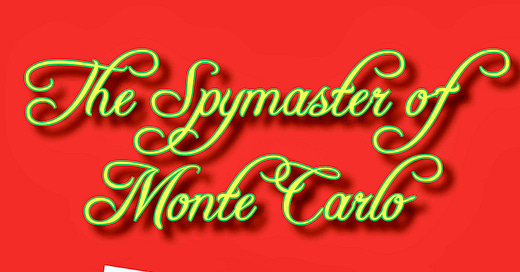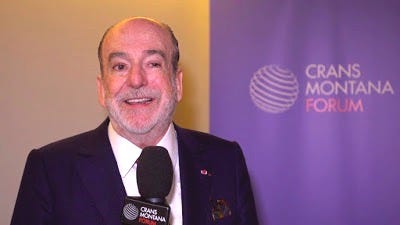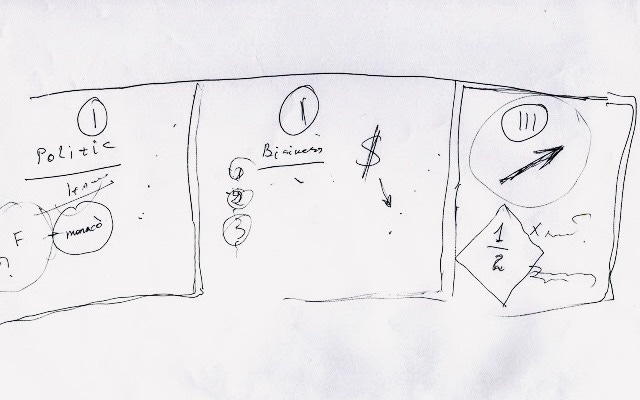July 2005
After less than a week’s vacation in Stone Harbor, New Jersey, I flew from New York-JFK to Nice, arriving at M-Base around noon.
My first meeting, two hours later, was with Conseil Nationale President Stephane Valeri.
Next I met with Jean-Pierre Mangepain, Vice-President of the Alpes Maritime region. He claimed to have a source in Nice, an Armenian named Agop Dagleian, who had witnessed certain incidents while working as security chief to Monaco-based Adnan Houdrouge, whom Franck Biancheri had green-lighted for investing into Monaco’s football team, ASM.
The issue—Franck Biancheri's corruption—was so time-sensitive for Prince Albert that I deigned to meet Dagleian myself, as soon as possible.
Mangepain also offered me a contact that had spent his career in various French special services—did I wish to meet him?
Next day I drove to the Alpes Maritime headquarters near Nice Airport to meet Mangepain and the man he proposed as an asset.
To prove his druthers, this potential source provided me with a seven-page “White Paper” on the Biancheri-Houdrouge relationship.
According to this document, Biancheri had orchestrated Monegasque citizenship for Houdrouge, who the French believed was engaged in false invoicing, French Customs violations, arms trafficking and money laundering.
I codenamed this gentleman LIDDY—after G. Gordon.
LIDDY also provided me with a report on a Monaco-based company called Sotrama.
LIDDY claimed Sotrama was a front for Russian arms dealing and money-laundering—and that President Putin’s cronies from St. Petersburg (and maybe Putin himself, a silent stake) were behind it.
The widow of the Russian who’d fronted Sotrama, Dmitry Skigin, felt uncompensated after his recent death from cancer.
When told Skigin’s ownership of the company was just a façade, with no inheritance due her, she squawked to French police.
LIDDY’s point: Monaco would be embarrassed if news of this got out.
Finally, LIDDY had investigated our Serbian target three years earlier and possessed a dossier he would make available to me.
Police Captain Yves Subraud’s investigation confirmed that Franck Biancheri had been “borrowing” laborers from the Forum Grimaldi (the convention center in Monte Carlo managed by Biancheri’s wife, Sylvia) to work on the construction of their new villa.
Subraud was also concerned that senior Monegasque politicians, namely, Stephane Valeri and Vice-President Claude de Boisson (Valeri’s chief political opponent)—were power hungry, having exploited Prince Rainier’s prolonged illness by chipping away at Palace rule, which, in Monaco, was supposed to be absolute.
Subraud said they would like to wrestle power away from the monarchy “and turn our prince into Prince Charles,” i.e., a constitutional monarchy whereby politicians, not the prince, wield power, rendering the role of sovereign largely ceremonial.
In the midst of this, Sergey of the FSB arrived in Monaco, along with his translator/lover, Oksana.
We met at 7:30 p.m. in the Bar Americaine of Hotel de Paris.
The French, he said, had been monitoring his movements since his first trip to Monaco in early June. This trip, he said, they’d followed him all the way from Nice Airport to Monaco.
The Russian insisted on hosting me for dinner in The Grill Room atop Hotel de Paris, where we were served four courses: Lobster ravioli with truffles, Le Loup, a selection of cheese, chocolate soufflé—and two bottles of excellent Chablis. (A tough job, but somebody had to do it.)
Sergey provided a report on Gocha Arivadze, the Georgian ex-operator of ARSI gas stations in Russia, which validated what we already knew about him.
From other sources, I knew that Arivadze’s infiltration of Prince Albert’s social orbit had intensified. He was now said to be tight with Irish cardboard box tycoon Michael Smurfit and others who made the prince’s court their playground.
Sergey’s strategy for dealing with bad guys was simple: If you can’t stop them, become head of them.
It was such a role, as Godfather, to which Sergey aspired. He would solve all of our problems in some kind of Faustian pact.
Sergey confirmed that our Serbian target was working with notorious Russian arms-dealer Victor Bout.
Why not throw Bout’s butt in jail? I asked. (Bout then lived in Moscow, protected by Putin.)
“Another one will come along to replace him," replied Sergey. "Better to co-opt.”
At seven in the morning on July 10th, a massive storm settled over Monaco dispensing violent lighting bolts with ferocious thunder—a message from Prince Rainier?
The storm cleared by 11:15 when Prince Albert arrived at M-Base.
He had made his final decision: Franck Biancheri would NOT be appointed chef-de- cabinet.
Instead, he had under consideration Jean-Luc Allavena, a Monegasque living in Paris.
The prince scribbled this name and tasked me with vetting him.
He also requested I continue investigating Biancheri with a view to removing him as finance minister.
Then I briefed the Prince on Jean-Paul Carteron:
As a young man with a law degree from the University of Paris, Carteron tried to break into French politics but could not find support and lost several elections.
Perhaps disillusioned with the system, he left France in 1981 and went to work as a lawyer for Jean-Claude “Papa Doc” Duvalier of Haiti and wound up looking after Papa Doc’s huge fortune.
When Papa Doc died, Carteron carried on with Baby Doc Duvalier, for whom he facilitated real estate deals along the Cote d’Azur and in Monaco.
The Duvalier regime was brutal, murderous and corrupt—the beginning of Carteron’s own financial base.
As Haiti’s ambassador to the UN in 1985, Carteron took the opportunity to forge strong links with Eastern European countries, and utilized those contacts as the basis for creating the Crans Montana Forum in Switzerland in 1989.
Carteron was a Swiss national on the basis of his first marriage to a Swiss national, Patricia Luyet, who apparently ran off with Carteron’s mistress!
Only after bloodying his hands with the Duvaliers and enriching himself did Carteron portray himself as a “humanitarian.”
The forum endeavored to provide respectability for brutal, corrupt regimes in Africa, from which Carteron personally profited.
One notable example is Congolese President Sassou N’Guesso’s 600,000 Swiss-franc “contribution” to the forum, part of which benefited Carteron personally.
By 1996, the Swiss became disenchanted with Carteron and requested he move his forum elsewhere.
They suspected him of money laundering, and his forum gave them logistical headaches due to its dubious participants, many of which had to be kept under surveillance while in country.
Expelled from Switzerland, Carteron chose Monaco as a new base and received permission from Prince Rainier to create a Monaco S.A.M. and stage his forum inside the principality.
Carteron began to call his private entity the Monaco World Summit.
Leaders of other countries invited to participate for a fee were given the impression, because of its name, that the summit was an official Monaco event or at least sponsored or sanctioned by Monaco, which it was not.
Once he institutionalized his summit in Monaco, Carteron began to establish himself as a professional middleman.
His specialty: brokering honorary consulships to Monaco from Eastern European and Balkan countries.
His standard rate to get someone named as honorary consul to Monaco: 50,000 euros or, in some cases, an expensive Breguet wristwatch.
We have also received reporting that Carteron laundered money in Monaco for Bulgaria’s prime minister, but we have not been able to validate this.
The prince stated that if Prince Rainier had known Carteron’s forum had been expelled from Switzerland, he never would have allowed it to function in Monaco—and pondered aloud about inviting Carteron to move his forum elsewhere.
I suggested that because the forum brought commerce to Monaco and was therefore good for the economy, it should be allowed to continue, but only on the basis that Carteron remove the word Monaco from its name. Otherwise, Carteron’s private forum was easily confused with official state sponsorships.
The prince returned to M-Base later that day, at 5:30, for a second meeting with Sergey, as requested by the Russian.
Sergey said he had a plan.
He asked for a pen and a single piece of letter-size paper on which he drew three squares in a row, like a cartoon strip.
He titled the first square Politic, beneath which he drew two circles attached to each other, one large, and the other small. Inside the small circle he wrote Monaco. Inside the large circle he wrote F and a question mark. (I assumed this stood for France.)
Inside box number two (he used Roman numerals), Sergey wrote Bisiness. Next to that, he scribbled a dollar sign with an arrow pointing downward.
In box number three, Sergey drew a circle within which he scribbled an arrow pointing—as if it were a numberless clock—at 2:30. Beneath the circle, a diamond shape in which he wrote the fraction for one-half.
I hope one day either a symbolist or a psychiatrist will explain to me what these three boxes mean.
I’ll venture a guess that Sergey meant he would handle all of the prince’s problems for half of the profits, as he seemed to be angling for an unspecified deal, and finally threw up his arms and said, “It’s up to you—you’re in charge.”
I saw the prince out to the elevator, as usual, leaving Sergey and Oksana in M-Base, supervised by my deputy.
“Did you like the plan?” I asked, straight-faced.
Albert nodded and said simply, “I’m going to strangle you.”
But we shared a good a laugh on the way down over spleeny Sergey, who was nuttier than fruitcake drenched in hazelnut liqueur and glazed with peanut butter.
Next day, in keeping with my never-ending quest for high L.Q. (laugh quotient), I cruised the Med again with Sergey and Oksana.
Sergey wore his favorite outfit: white slacks, white loafers and his garish silk shirt emblazoned with fish—and sat ramrod upright, staring straight ahead, expressionless, through the. cruise to Cannes.
After a stroll along the Croissette, we settled in for lunch at Hotel Carlton’s buffet by the beach.
I invited Sergey to attend the party at M-Base we'd planned next evening to celebrate Prince Albert’s investiture.
“Nyet,” he replied. (That went for Oksana, too.)
However, said Sergey, he would like to meet my Latvian friend, EJ the interior minister. Could I arrange that?
“If he wants to meet you,” I said.
The highlight of this boating excursion arrived upon our return to Monaco’s port. As this purported "special ops" tough guy walked the wooden plank off the boat he suddenly squealed in pain.
Something had pierced his foot.
The way Sergey carried on, I thought he must have severed a toe. But on closer inspection, all Sergey suffered was a tiny wooden splinter. He cried out for a needle, antiseptic ointment and bandages, leaving me troubled about the sorrowful state of Russian special forces.
Sergey, it transpired, was a wuss.
Needless to say, our codename thereafter for Sergey was… SPLINTER.






